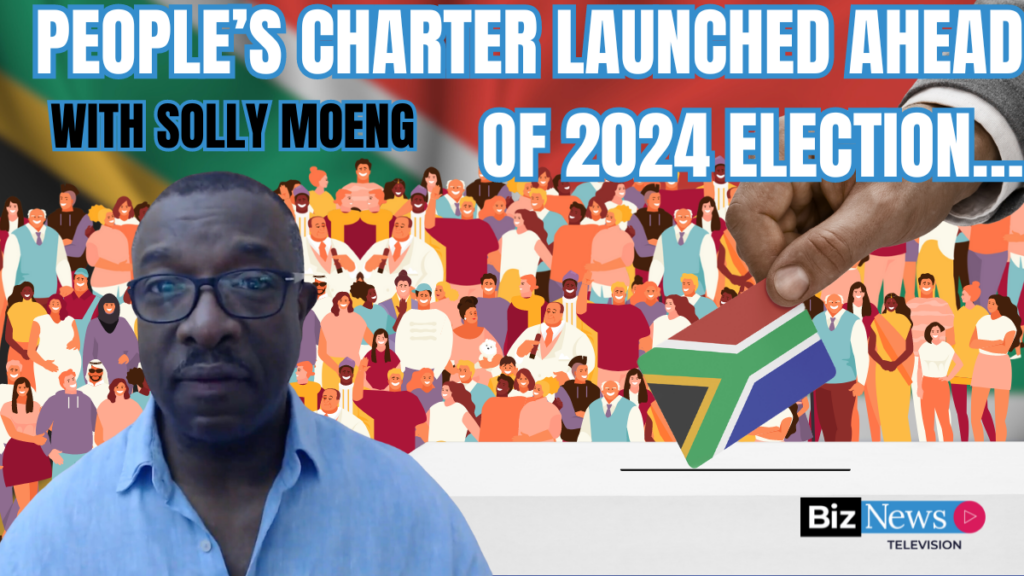After three years of consultations, The United South Africa Movement (TUSAM) has launched the South African People’s Charter and the Charter of Citizens’ Obligations. In this interview with BizNews, TUSAM’s Solly Moeng says “this system is built to protect the ANC (African National Congress)”, and that it has to change “because these institutions that we built at the dawn of our democracy, with everybody thinking that they will stand between us and hell, have shown to be weakened, to be repurposed, to serve the interests of politicians who are criminals. We need to create buffers.” He also calls on citizens to inform themselves because “people still get taken for granted by political entrepreneurs on the basis of their poverty and on the basis of their lack of knowledge”. TUSAM – a non-partisan civic movement – will endorse only those political parties that pledge support for the People’s Charter.
Sign up for your early morning brew of the BizNews Insider to keep you up to speed with the content that matters. The newsletter will land in your inbox at 5:30am weekdays. Register here.
Watch here
Relevant timestamps from the interview
00:00 – Introduction
00:29 -What created a need for the People’s Charter?
01:51 – What are the most important demands in the charter?
05:32 – TUSAM is not a political party
08:16 – Will you issue a list of parties endorsed by TUSAM?
10:42 – What are the most important obligations of citizens?
14:58 – People In particular you want to give credit to
20:08 – Conclusion
Listen here
Read the charters here:
Highlights from the interview ___STEADY_PAYWALL___
After three years of consultations, The United South Africa Movement (TUSAM) has launched the South African People’s Charter and the Charter of Citizens’ Obligation.
In this interview with BizNews, TUSAM’s Solly Moeng says it was necessary because the system has “proven to be vulnerable to abuse, to repurposing, reshaping, weakening, just to save the interests of criminal people”.
Moeng says “this system is built to protect the ANC (African National Congress)”, and that it has to change.
“So that’s why it’s really important that what we need is more than replacing one face with another, a smiling or dancing face.
“We must have these conversations about the systemic changes that must happen because these institutions that we built at the dawn of our democracy, with everybody thinking that they will stand between us and hell, have shown to be weakened, to be repurposed, to serve the interests of politicians who are criminals. We need to create buffers.”
Moeng says people want “a return to the kind of leadership that can remind all of South Africans, irrespective of their religion, their culture, their ethnicity, their race, their gender identity, that they belong”.
Describing how TUSAM – as a non-partisan civic movement – will get people to embrace the Charter, Moeng says: “…what we are saying to political parties with this charter…we will vote for you if you do these things for us. So what you want to do is attach a pledge to the charter. And that’s been the aim. So that when we have engagements with political parties, we say…if you agree with the content and you agree to support it, sign here. It’s a big ask. Some will do so. Some would say, yeah, we support you verbally, not wanting to sign anything. But we have a sense, through our engagement…of the kind of political parties there that align at a broad level…We’re happy to endorse those.”
Dealing with the obligations of citizens, Moeng says: “…if you look at the state of South Africa today, it’s not just about what government or politicians must do. It’s also about what we do. A lot of times, people have somebody, a brother, a sister, a friend, coming home with stolen money, stolen TV, stolen car, stolen stuff. And we take these things, we protect them, we don’t tell the police, the authorities about these people. It’s wrong.
“So we support, we feed the beast that is the criminality in South Africa. People damage infrastructure. All we do is take pictures or videos to share on social media. But we’re not doing enough to say, what can I as an individual do?”
He also urges people to inform ourselves. “We must vote on the basis of knowledge. A lot of people in South Africa might be educated academically, but civically they don’t. People still get taken for granted by political entrepreneurs on the basis of their poverty and on the basis of their lack of knowledge.
“So we need to ensure over time – these are not easy wins – we need to ensure that people in South Africa are trained, hopefully from school…about how society functions. What… is the role of all the key institutions, of the police, of the civil society, of the media, of the state institutions, of the Chapter 9 institutions, at a high level, basic level, what does vote mean? Why is it important that I vote? Do I vote on emotion or do I look for other things before I make a vote?”
Read also:
Multi-Party Charter: A new pillar for post-2024 South Africa, promoting unity and decentralisation – Martin van Staden
Multi-Party Charter rejects Referendum Party: What it means – Martin van Staden
De Beer: How Zuma-Ace pact will hurt ANC, boost Multi-Party Charter
Visited 18 times, 18 visit(s) today
>>> Read full article>>>
Copyright for syndicated content belongs to the linked Source : BizNews – https://www.biznews.com/interviews/2024/03/01/peoples-charter-launched-2024-election
